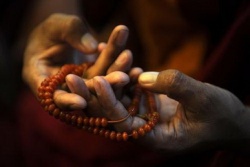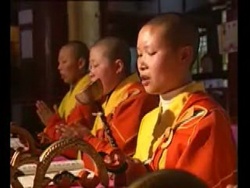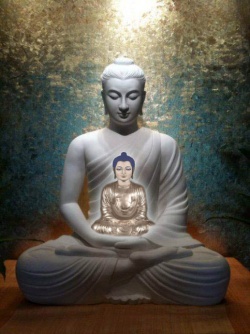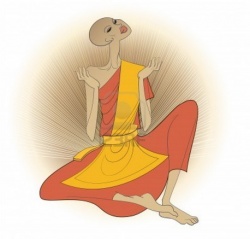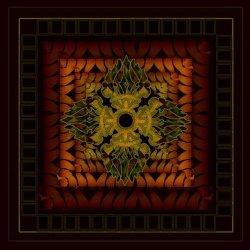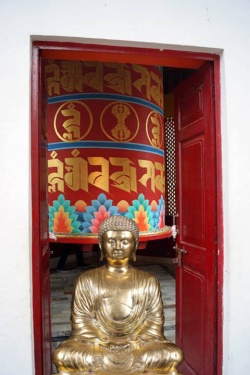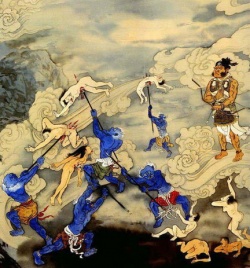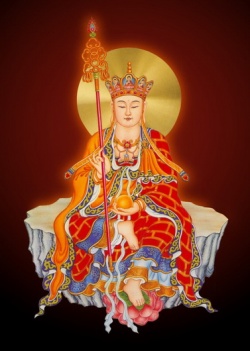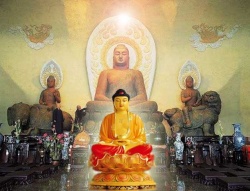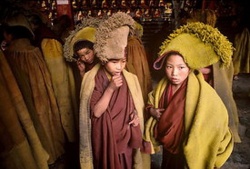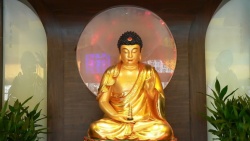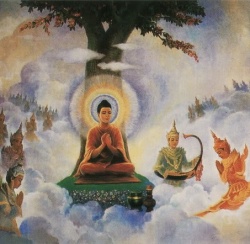Manual of Abhidharma - Reading Nine: The Five Immediate Misdeeds, and the Concept of a Schism
The following selections are from the First Dalai Lama’s commentary to the Treasure House of Knowledge (Abhidharmakosha), entitled Illumination of the Path to Freedom. They include the root text of Master Vasubandhu.
99
Introduction to the Five
Immediate Misdeeds
Split community, a thing without a
Link, its nature to be unreconciled.
Not afflicted, neither specified,
Something the community possesses.
The disapproved that leads to it’s a lie;
This the one who made the schism has.
[IV.389-394]
The first three of the five “immediate” misdeeds mentioned above are different types of killing, and the fifth is a preliminary to killing. These are, therefore, deeds of the body. The fourth of the immediate misdeeds is a kind of lie, and therefore a deed of speech.
Now a split in the community of monks, at least according to the Detailist system, is said to “exist as a distinct entity—it is a thing (one of the factors) without involvement in a mental link; its basic nature is for the two factions of the community of monks to be still unreconciled.
Such a split can also belong to both those who have eliminated their mental afflictions and those who have lost even their most basic virtue; the nature of the split is thus such that it is not afflicted, but neither was it specified as being virtue. We can therefore say that it is ethically neutral, without acting as an obstacle.
The kind of schism described here is something the community of monks on both the opposing sides possesses. It is not though the “immediate” misdeed itself. The disapproved deed that leads to the community’s division—its cause—is a lie that functions to split the community up.
It is the lie which constitutes the immediate misdeed, and this the one who made the schism in the community has—whether it be Devadatta or someone else.
100
Consequences of Immediate Misdeeds
It ripens to that Without Respite for an eon;
Extra torment comes from extra ones.
[IV.395-6]
“Into what kind of consequence,” one may ask, “does the immediate misdeed of dividing the community ripen?” It ripens into suffering, for the person who committed it, within the hell known as “Without Respite.” He must endure this suffering for the length of an intermediate eon.
“And what happens,” one might continue, “when a person commits any of the remaining immediate misdeeds?” Committing any of these other immediate misdeeds is certain to lead one to a birth in the hells, but in a more specific sense it is not a definite thing that they will always bring a birth in the hell Without Respite.
One might next pose the following question:
Suppose a person commits two, or even more, of the “immediate” misdeeds. If he takes only one birth in the hells, then you would have to say that committing several of these deeds is no more serious than committing only one. If one the other hand he takes two or however many births in the hells, you can no longer say that these deeds give “immediate” results, and that their results are invariably experienced in the very next life.
The Detailists respond with the following claim:
A person takes no more than a single birth in the hells as a result of committing “extra ones”—that is two, three, or even more immediate misdeeds. His body there in the hell of “Without Respite” though is twice the normal size (or more, according to the number of such deeds committed), and much more sensitive. He therefore feels an extra amount of pain: his torment increases in multiples the same way as his size. This frees us of both the problems you raised; incidentally, the earlier of the deeds is the one that projects the birth and the later one (or ones) finishes the details. The Sutrists and others though explain the point as follows: If a person commits a number of immediate misdeeds, he is born into the hell of torment Without Respite again and again. There is though no other type of birth taken between the body in which the deed was done and the body of the hellbeing, so the result is still “immediate.” The idea that the result must be experienced in the very next life cannot be substantiated.
101
Details of a Schism
The schism’s made by an intellectual,
Full monk with his morals, elsewhere, children.
[IV.397-8]
What kind of person causes the split? The schism is made by someone who is a full monk and an intellectual type with all his morals. The person in question cannot be a layman, or the type more inclined to sensual pleasures, or someone who has lost his morals. This is because, first of all, he is vying with the Buddha. Secondly, he must have a very sharp mind. Finally, the community of monks would lend no credence to such types.
Where does the split occur? It must take place “elsewhere”—that is, in some location other than where the Buddha himself is residing. It could never occur in the direct presence of the Buddha, since his overwhelming glory would never permit it. And who is it that gets split off? It is only “children”—that is to say, common beings [which refers to those who have yet to see selflessness directly]—among the community of monks who are estranged. Realized beings cannot be led into a schism, for they possess a faith in the Buddha born from knowledge: they have perceived Reality directly.
Some people have claimed that it is also impossible to split up persons who have achieved the “mastery” stage of the path of preparation.
102
Details of a Schism, Continued
Split at the acceptance of another
Teacher, path. It does not remain.
Accepted as a breaking of the wheel.
[IV.399-401]
One may ask at what point a schism is considered to have occurred. The community of monks is considered split at that point when, first of all, there is an acceptance of some Teacher (namely, Devadatta) other than the Buddha himself. Secondly, this is the point where there is an acceptance and attempt to practice some path other than that enunciated by the Buddha. This opposing path consists of the “Five Rules” set forth by Devadatta for attaining freedom from the world:
1) giving up the use of curds;
2) giving up meat;
3) giving up salt;
4) giving up the traditional patchwork robes; and
5) staying in temples inside of towns.
And how long does the schism last? This split in the community has its own peculiar nature: it does not remain for more than one 24-hour period.
A division of the community of monks is accepted as a breaking of the wheel of the teachings, for no new paths start up in the minds of anyone at all until the estranged monks are reconciled. What we’ve described here is the immediate misdeed of a schism in the community; other types of divisions are possible, but do not constitute the “immediate” type of deed.
103
Further Details of a Schism
On the Dzambu Continent, nine or such.
Split activities, on three continents;
This one with involvement of eight or more.
[IV.402-4]
The break in the wheel described above occurs on Dzambu Continent (as this is where the Buddha resides), but not on the others. As for the individuals involved, the deed can only be accomplished with nine “or such” (meaning “or more”) full monks. This is because it takes at least four monks to make what we call a “community” of monks; there have to be two such groups created, along with one person who incites the schism—and he too must definitely be a full monk. This of course represents the bare minimum—there is no certainty that a great many more individuals might not be involved in such a schism.
Now what we call a “split in the activities” of the community can occur on three different continents—that is, on any one where the teachings exist, which would eliminate only the northern continent of Terrible Sound. This type of schism occurs only within the confines of a single physical monastic institution, and where the required rites of the monastic confession and so on have been performed with unity up to that point.
How many individuals are required for this type of schism? A split in the activities of the community requires no separate person to incite the division, so the deed can be accomplished with the involvement of eight or more full monks.
104
Details of a Schism, Concluded
A breaking of the wheel never occurs
At the beginning, the end, before the faults
Or one of The Pair, after The Able passes,
Until the residences set apart.
[IV.405-8]
Now a breaking of the wheel of the teachings as described above never occurs at “the beginning”—that is, during the period just after the Buddha has first set this wheel in motion. This is because at this point everyone shares a peculiar sense of unity, a perfect harmony born of communal joy.
Neither does the break ever occur at the end of the Buddha’s precious life—when he passes into his final nirvana. This is because his followers at this point share exactly the same thoughts: a special awareness of how rare the Buddha is, and strong feelings of resignation with life once its impermanence has been drawn to their attention then.
Verses on Vowed Morality contains the following lines:
Instructions of the Teacher remain pure,
Free of any breach for twelve years’ time,
Free from taint, like waters of the autumn,
Working to remove the mental afflictions.
This means that a schism in the community will furthermore never happen before certain faults occur—faults in the way that followers view the teachings and maintain their morality. For until such time, the teachings themselves remain without defect.
Furthermore, no division can occur before the appearance of one or another of The Great Pair. This is because the division is of very brief duration and could not otherwise be brought to an end, since the reconciliation is always performed by one of these two.
No schism can occur after The Able One himself passes on (that is, subsequent to his final nirvana), since there is then no Buddha present for the leader of the schism to compete with.
Finally, no division of the community can occur until such time as different monastic residences, both large and small, are set apart from each other. This is because divisions between the community of monks that occur within a single monastic institution do not qualify as a breaking of the wheel, although they are a type of schism. In summary then we can say that there are six periods during which it is impossible for a break in the wheel of the teachings to occur.
Now this schism is something that depends upon the past deeds of the disciples involved, so does not occur with every single Buddha. The explanation goes that, in a former birth as a bodhisattva, our own Teacher (the Leader of the Shakyas) created a schism among the followers of a certain great adept who possessed the five types of supernormal powers: the present schism is just the eventual ripening of this misdeed. According to the teachings for those of higher capacity though this description is not to be taken literally.
105
What Makes Deeds Immediate
As objects of assistance, qualities,
Since you reject and also eliminate them.
[IV.409-10]
One may ask the following: “Why is it considered an `immediate’ misdeed only when a person performs one of the actions such as killing his father or mother? Why isn’t it the same kind of deed when a person commits an act, such as the killing, towards someone else?” The answer is that killing one’s father or mother is an “immediate” misdeed as they are very special objects, due to the great assistance they have rendered one: they have given you a body, a body with which you can attain freedom. And by thinking to kill them you reject them; by actually undertaking the deed, you also eliminate them.
The case with enemy destroyers, the community of monks, and Buddhas is similar. They are objects possessed of exceptional qualities; by thinking to do the particular deed towards them you reject them, and by actually undertaking the various deeds involved you create conditions which are not at all conducive to their continued life.
Here we should mention that, although it is impossible for anyone to actually kill a Buddha, the thought to do so is a rejection of the Buddha. Kinds of actions other than those described above are in no way as serious, so are not counted among the “immediate” misdeeds.
106
Clarification of Certain
Immediate Misdeeds
It is, even should the organ switch.
Mother, the one whose menses he came from.
[IV.411-12]
One might ask the following question: “Suppose a person kills a father or mother whose sexual organ has changed. Is it still an `immediate’ misdeed?” Even should the sexual organ of one’s father or mother switch (and they thus become a female or a male, respectively), it is still the “immediate” deed of patricide or matricide if he kills them. This is because one has still killed the person who performed the function of a father or mother: the one who endowed him with his very special body.
One may then pose another question: “Suppose the embryo in one woman’s body is removed and placed in the womb of another, and the child takes birth from this woman’s womb. Killing which of these two women would constitute the `immediate’ misdeed?” The mother of the person in question is the former of the two women: the one whose menses he came from. Therefore killing this first woman would be the immediate misdeed; she played the principal role in providing the person a body fit for gaining freedom. We could not consider the second woman, the woman who kept the child in her womb, the child’s mother—this act alone would not make hers the principal role.
Now it is not an “immediate” misdeed if a person undertakes to kill his father or mother and ends up killing someone else; nor is it if one undertakes to kill someone else and ends up killing one of his parents. This is because, with an “immediate” misdeed, the actual commission of the act must be concluded with the same person towards whom the act was undertaken. And this is true of neither of the cases mentioned. Similar examples would be where the person killed his mother by accident as she hid under his bed, or where the son of the washerman threw a rock to kill a fly and smashed his father’s skull instead. Suppose that a person, in the single blow of some weapon, kills his mother and some other living being. The non-communicating form here consists of both deeds: the “immediate” misdeed and a simple act of killing. The communicating form though is subsumed only by the immediate deed, since an immediate deed possesses such tremendous force.
Next let’s take a case where a person kills his father, a father who happens to be an enemy destroyer as well. Or suppose he kills a person who is both his mother and an enemy destroyer too. Here he commits a single “immediate” misdeed, that of killing an enemy destroyer—for only the single physical base of a person was involved.
One may ask how then we reconcile this position with the following message, quoted in Divisions of the Word:
In days gone by there was a king of Rauruka City by the name of Udrayana. He was murdered by his son Shikhandi, who thus killed a person who was both his father and an enemy destroyer. The King’s last words to the assassins sent by his son were “Return and tell Shikhandi for me, `You have now committed two immediate misdeeds—that of killing your father, and that of killing an enemy destroyer.’”
The point of the king’s words was to tell his son that he had on two accounts committed an immediate misdeed, or that he had committed the deed in two different ways. There was though no more than one immediate misdeed done.
107
Misdeeds and the Holy
Not with a mind to strike the Buddha, not with
An enemy destroyer after attack.
Freed from desire, results, impossible
For one who’s undertaken immediate.
[IV.413-6]
Let’s next consider the immediate misdeed of striking and drawing blood, with evil intent, from the One Thus Gone. It’s considered the immediate misdeed when a person uses his weapon with the intent to kill the Buddha, but it is not considered this type of misdeed when a person uses his weapon simply with a mind to strike the Buddha. This is because such a person lacks the “intent” stage for an act of taking life.
Suppose for a similar example that someone uses a weapon against a person who has yet to reach the stage of “enemy destroyer,” and then at some point after the attack the victim does attain this level. Suppose further that our new enemy destroyer then dies as a result of wounds incurred in the original attack. It is not considered the immediate misdeed with such a person, for his attacker did not undertake the action against someone who was an enemy destroyer.
One may pose the following question: “Suppose a person undertakes to commit an immediate misdeed. Is it possible for such a person—without abandoning this course of action—to achieve the state where he is free of desire, or to gain one of the results?” The answer is that it is impossible for one who has undertaken an immediate misdeed to gain either the level where he is freed from desire or one of the results. The two states of mind are completely contradictory.
Severity of Immediate Misdeeds
Accepted as most heinous of misdeeds.
[IV.417-18]
One may ask, “Which of all these immediate misdeeds is the most serious?” Lying in order to divide the community of monks into two parts is accepted as the most heinous of misdeeds among all the immediate. This is because a person has thereby struck a blow to what is known as the “reality body” of the One Thus Gone. And as long as the community remains unreconciled, there is a general stop in the world to certain great virtuous deeds: no one finds the true certainty, no one achieves the results, no one gains freedom from desire, and no one brings an end to all stains.
Moreover, such a division prevents persons from engaging in meditative concentration, and from reading scripture—from daily recitations and from contemplations. This then interrupts progress in gaining both higher births and the states of nirvana and Buddhahood. All the inhabitants of the world, on up to the great pleasure beings, are thrown into turmoil—they lose their happiness, they lose their freedom, they lose their ability to think. And the perpetrator must take his birth in the lowest hell, Without Respite, for an eon. These are what make this deed the worst.
The next most grave of the immediate misdeeds is the fifth; then come the third, the first, and second—in that order. Thus the murder of one’s father is explained as the least serious of the five.
One may object that this description contradicts the statement in sutra that, of all the three types of wrong, the three deeds of thought are most serious and that—within these three—holding mistaken views is most grave. There is though no inconsistency here. The misdeed we’ve described leads one to the hell “Without Respite” for a full intermediate eon; from the viewpoint of the magnitude of the result that ripens from the deed, we can say that dividing the community is the most serious of all the immediate misdeeds.
One the other hand there is the case where the raw emotion of fury in the mind of the great adept brought death to the many individuals of Dantaka Monastery and other places; we can say then that, with respect to the general result of death among the populace, actions of the thought are the most powerful among three groups of deeds that relate to the three passageways. And with respect to the “creative” result of losing one’s most basic virtue, mistaken views would be the most serious of the deeds of the thought, for the others in this group lack the power to make one lose this virtue. To express it in a different way, we can say that each was stated to be the most serious: dividing the community, deeds of the thought, and holding mistaken views—but only with the respective assumptions that one is limiting himself to the five immediate deeds, deeds of the three passageways, or the five views.
See also
- Manual of Abhidharma - Reading One: Introduction to Abhidharma
- Manual of Abhidharma - Reading Two: The Nature of Karma, and What it Produces; the Detailist Concept of ''Non-Communicating Form''
- Manual of Abhidharma - Reading Three: Types of Deeds, and the Nature of Motivation
- Manual of Abhidharma - Reading Four: The Correlation of Deeds and Their Results
- Manual of Abhidharma - Reading Five: How Karma is Carried, According to the Mind- Only School
- Manual of Abhidharma - Reading Six: How Emptiness Allows Karma to Work, According to the Middle-Way School
- Manual of Abhidharma - Reading Seven: Black and White Deeds, the “Path of Action,” and the Root and Branch Non-Virtues
- Manual of Abhidharma - Reading Eight: Most Basic Virtue, and the Projecting and Finishing Energy of Deeds
- Manual of Abhidharma - Reading Nine: The Five Immediate Misdeeds, and the Concept of a Schism
- Manual of Abhidharma - Reading Ten: The Relative Severity of Deeds and What Causes It
- Manual of Abhidharma - Additions Part 1
- Manual of Abhidharma - Additions Part 2
